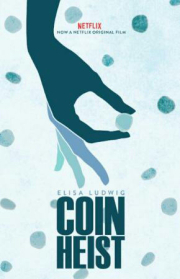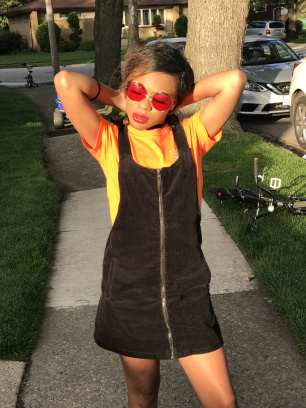At the end of April, the Martha’s Vineyard Film Center held its first Spectrum Film Festival, featuring films with an L, G, B, T, and/or Q connection. Like the LGBTQ coalition itself, the films had an uneasy relationship with each other, but it was a worthy effort.
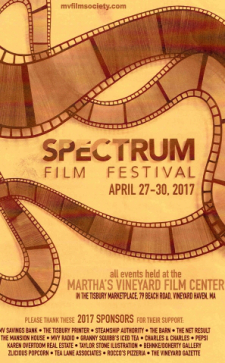 Perhaps the worthiest thing about it was the effort to push beyond the screen and include live Q&A or interviews after each show, usually with people who had some connection to the film.
Perhaps the worthiest thing about it was the effort to push beyond the screen and include live Q&A or interviews after each show, usually with people who had some connection to the film.
On the festival’s opening night, The Freedom to Marry was followed by a conversation between Mary Breslauer, a Boston-based communications consultant with Vineyard connections, and Mary Bonauto, who argued Obergefell v. Hodges, the pivotal same-sex marriage case, before the U.S. Supreme Court and was featured in the film. Breslauer was live onstage at the Film Center; Bonauto appeared on the screen through the wonders of digital technology.
I was on the panel that followed the film Cloudburst, which featured two stellar actresses — Olympia Dukakis and Brenda Fricker — in a film written and directed by guys who evidently couldn’t imagine that anyone would watch a film about two women unless a male supporting actor was on hand to steal the show. I could go on but I won’t.
The panel was titled “The Shifting Tides of the LGBTQ Landscape on the Vineyard.” Fortunately no one asked me what that meant, because I don’t have a clue. In “Gay on MV” I blogged about my personal take on the island’s recent gay and lesbian history, so I’m not going to go on about that. It did come up during the panel discussion, thanks in part to several in the audience who were there along with me and a bunch of others. Part of that recent history was ILGA, the Island Lesbian and Gay Association.
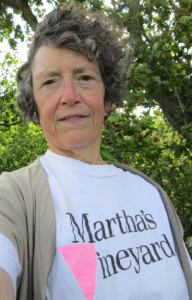
The closet T-shirt
In the early to mid 1990s, ILGA offered two T-shirts. One featured the words MARTHA’S VINEYARD, and the V in VINEYARD was a pink triangle. I think of it as the closet version, because you could wear it down Main Street or Circuit Ave. in the height of summer and nobody knew what the pink triangle meant.
The other one was bold and blatant. NO MAN IS AN ISLAND LESBIAN, it read, across a pink triangle, and then, in smaller print underneath, and Gay Association of Martha’s Vineyard. This one I wore mostly off-island because, no matter how bold and blatant you are, at some point you get sick of noticing people trying to pretend they aren’t staring at you.
At least I did.
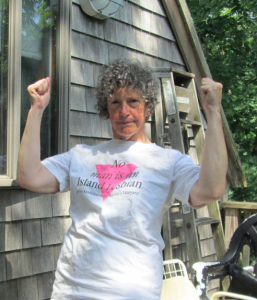
The blatant, in-your-face, very un-Vineyard shirt.
This is the one I wore to the film festival. It was a hit. The Vineyard Gazette story about the Spectrum Film Festival shows me and my shirt onstage with my fellow panelists. Here’s what it looks like up close ->.
The panel’s moderator opened with a bit of island history: In the last three decades of the 19th century, until fire destroyed it in 1906, a summer colony that catered to musicians and singers flourished overlooking the Lagoon. This colony was run by a gay (male) couple who were apparently quite open about their relationship.
The point being made was that Martha’s Vineyard has a tradition of tolerance that goes way back.
People really, really want to believe this. Readers of my first (and so far only) novel, The Mud of the Place, ask me if it could happen now. (Mud takes place in the late 1990s, Jay Segredo, a gay man who grew up on the island and has lived “off” for 20 years, returns and sets himself up for disaster because he doesn’t dare come out to his close-knit family.) Their anxiety tells me that they really, really want to be reassured that it couldn’t, that a young gay man today wouldn’t worry about coming out to his family.
During the Q&A at the Film Center, several people raised examples of the Vineyard’s supposed tolerance. Like Innisfail, these stories generally involved summer people, creative types, and often both. My own experience was similar. I arrived in 1985 knowing virtually no one, and within a year or two had been absorbed into the island’s grassroots theater and music scene. There, diversity ran rampant. Everybody recognized the pink triangle. Outside the scene we were pretty discreet. “Don’t ask, don’t tell” was the order of the day.
Most — not all, but most — of us came from somewhere else. Even if we’d been here a while, we didn’t have extended family on the island. Unlike Jay Segredo, we had nothing to lose by being out as whatever we were: lesbian, gay, creative, intellectual, radical, or just plain weird. For many native islanders, the situation was very different. Family was key. Quirkiness was tolerated, even prized, up to a point, as long as it didn’t threaten to make you a stranger to your own family.
It took me a long time to get this. My family wasn’t happy and my town, though not oppressive, was boring. I couldn’t wait to get away. In the big city (Washington, D.C., in my case) I quickly fell in with others who’d fled their families and towns for similar reasons. We bonded around our politics, our creative aspirations, and our stories of what we’d left behind. We talked a lot about “community.” We wanted to be one. We thought we were.
In general, we didn’t do community all that well. In the absence of any containment mechanism, relationship breakups and political disagreements turned incendiary. And it wasn’t till I’d been on Martha’s Vineyard for several years that I began to understand why. Nearly all of us who had escaped to the big city were of the same generation, born within 15 or 20 years of each other. We had few elders to give us ballast with their experience and few children to give us reason to think ahead. The Vineyard by contrast was a multigenerational web. It didn’t always take care of its own, and old grudges lay just under the surface, waiting to blow up with a careless step, but it did manage to contain brushfires before they spread out of control.
The Vineyard, in other words, was the kind of place that many of us had fled from, and that some of us fled back to when we realized that unfettered self-expression by unrelated individuals did not create the kind of community we wanted to live in.
I was fascinated. My fascination grew into The Mud of the Place. And I’m still here, chafing at the restraints but unwilling or unable to leave.
The bottom line is that we tolerate what we think we can afford to tolerate. We don’t tolerate the monsters that are breathing down our necks — do you think we’re stupid? Twenty-five years ago, the Vineyard considered lesbians and gay men alien and threatening. Now? Not so much. Brazilian immigrants are more so, regardless of sex or sexual identity.
The summer people and the year-round summer people, they can be infinitely tolerant because they aren’t part of the web. Their web is somewhere else.
Advertisements Share this:


